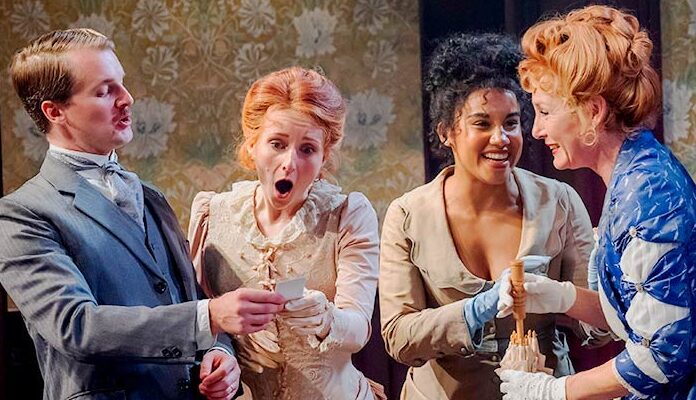At the end of the 19th Century, playwrights such as Oscar Wilde, George Bernard Shaw, and Arthur Wing Pinero cemented their reputations as satirists by producing works that poked fun at the contradictions and hypocrisy of upper-class British society. Their characters are obsessed with preserving a class-bound status quo of manners, social status and property, while succumbing to their own moral failings, thus cleverly highlighting the fragility of social conventions and the absurdity of maintaining appearances at all costs.
Less well known and presumably not as frequently revived, Pinero doesn’t quite match Wilde’s razor-sharp wit, nor Shaw’s depth of social commentary. Currently, The Menier Chocolate Factory has revived Pinero’s The Cabinet Minister, adapted by Nancy Carroll, who also marvellously plays Lady Twombley, the Cabinet Minister’s wife, who the play is truly about. The play remains set in Victorian England, albeit with a clever updated final moment at the end of the evening.
Lady Twombly is caught in the grips of multiple dilemmas – how to pay off her debts from overspending on decorating her home that she is frantic to keep secret from her husband, her desperation to marry off her daughter before the news of her debts is exposed, and of course maintaining proper social standing and reputation throughout. Lady Twombly is at odds with various characters, principally, her husband, Lord Twombley (Nicholas Rowe), her daughter, Imogine, (Rosalind Ford), a money lender (Laurance Ubond Williams) and his sister, Fanny Lackluster, (Phoebe Fildes) — a dressmaker in the morning, who insists on being addressed as a Lady of society in the afternoons. The plot is further thickened by Imogine’s two suitors – the hapless Scottish aristocrat, Sir Colin Macphail (Matthew Woodyatt), vs. the society-rejecting world-explorer and her childhood playmate (George Blagden). Some of the evening’s most humorous moments are delivered by Sir Colin’s mother, dryly and adeptly played by Dillie Keane, who waxes on and on about the environs, beasts, and castles of her Scottish estate.
Staging a play set in the starched world of Victorian manners that is also a farce as well as a comedy of social manners would be a challenge for any modern director, and Pinero’s somewhat one-dimensional characters don’t make it any easier. Director, Paul Foster, mostly succeeds in knitting together all the elements, while also working to make the play relevant to contemporary audiences.
The updated production offers up some fun and clever sexual double-entendres, and the production is layered by having the actors play various musical instruments throughout the evening. We somehow accept characters dressed in corsets and bustles plucking on a violin or cello, or an accordion and piano duet adding a pleasant punctuated moment to the action. The play picks up more energy in the second act after we’ve gotten past the various threads of multiple character introduction and plot exposition. The delightful set places the audience on two sides of the stage, and changes from the Twombly’s richly decorated drawing room in the first act, to the dour great room of the Macphail Scottish castle in the second.
A pleasant evening all told, even if it doesn’t quite scale the heights of character, language and social commentary.
Through 16 November
By: Arthur Wing Pinero
Adaptor: Nancy Carol
Director: Paul Foster
Set and Costume Designer: Janet Bird
The cast includes: George Blagden, Joe Edgar, Phoebe Fildes, Rosalind Ford, Dom Hodson, Dillie Keane, Nicholas Rowe, Laurence Ubong Williams, Romaya Weaver, and Matthew Woodyatt

